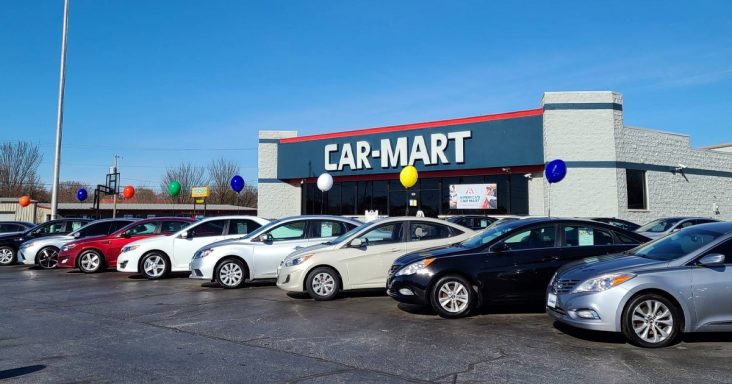Car-Mart earnings to rise 39% in third quarter, analysts expect; stock hits record high
by February 11, 2021 3:32 pm 891 views

Rogers-based America’s Car-Mart Inc. is expected to post earnings and revenue increases for the third quarter of fiscal 2021. Meanwhile, the stock for the buy here, pay here used car dealer closed Thursday (Feb. 11) at a record high.
Car-Mart will report earnings for the period ending Jan. 31 after the markets close Tuesday (Feb. 16). Shares (NASDAQ: CRMT) rose Wednesday (Feb. 10) to a high of $132.96 before closing Thursday at a record high of $135.22. The stock has consistently closed above $100 since Nov. 16. In the past 52 weeks, the stock has ranged between $135.22 and $35.18.
Earnings are projected to increase by 39.3% to $2.55 per share in the third quarter, from $1.83 per share in the same period in the previous year, based on a consensus of three analysts. Revenue is expected to rise by 16.1% to $216.87 million, from $186.73 million.
In an earnings preview, equity analysts John Hecht, Kyle Joseph, Ryan Carr, and equity associate Lance Jessurun, all of Jefferies LLC, expect earnings to rise as a result of an increase in sales volume and interest income. Gross adjusted margin on auto sales is expected to be 40.4%, up 0.17 percentage points from the same period in the previous year. The analysts projected sales to rise 2% to about 13,580 vehicles, and the average retail sales price to increase 10% to about $12,925.
The Jefferies analysts noted credit “remains solid,” and the company has controlled costs effectively. “(Car-Mart’s) business model is a defensive one – the highest losses came in 2007 while its lowest losses were in 2009-2011 given favorable competitive dynamics. Management’s strategy of ‘blocking and tackling’ by investing in long-term employees, building community-based stores, and selling reliable vehicles that will be less likely to charge off has paid off as the company has consistently delivered strong top-line results.”
Car-Mart recently announced its total permitting borrowings had increased to $326 million, from $241 million.
In December, Car-Mart opened its 151st dealership in Edmond, Okla. It was the company’s third dealership to open in fiscal 2021. Car-Mart has dealerships in 12 states throughout the south-central United States. It also plans to open a dealership in Norman, Okla.
USED VALUES RISE
Wholesale used vehicle prices on a mix-, mileage- and seasonally adjusted basis increased 1.2% in January, from December. This led the Manheim Used Vehicle Value Index to rise by 15.1% to 163 in January, from the same month in 2020.
Prices rose throughout January, and in the last week of the month, values of three-year-old vehicles at auction rose 0.4%, the strongest weekly increase since 2014, according to Manheim.
Total used vehicle sales fell by 5% in January, from the same month in 2020, according to Cox Automotive. The seasonally adjusted annual rate of sales was 38.1 million, down from 40.1 million in January 2020. The rate in December was 38 million. The rate for used retail sales was 20.8 million, down from 21.2 million in January 2020 but up from 20.2 million in December.
The vehicle supply of used retail was 39 days at the end of January, below normal levels, or about 44 days, based on vAuto data.
New vehicle sales declined 3.7% in January, from the same month in 2020. The seasonally adjusted annual rate of sales was 16.6 million in January, down from 16.9 million in the same month in 2020 but up from 16.2 million in December. New vehicle inventory declined by 21% to 2.8 million units in January, from the same month in 2020.
According to Manheim, uncertainty amid the COVID-19 pandemic led to lower spending in the winter. The first estimate of the fourth-quarter real GDP increase was 4%. This was less than the 4.2% that was expected. Personal consumption rose 2.5% but was expected to increase by 3.1%. Spending on goods fell 0.4%. Spending on services rose 4%. Real GDP declined 2.5% year-over-year. For 2020, GDP declined 3.5%, the worst annual performance since 1948.
The pending home sales index declined by 0.3%, the Manheim report shows. New home sales increased by 1.6%. Home sales overall declined in the fall but partially improved by the end of 2020. Existing home sales, which are closings of contracts already signed on existing homes, rose 0.7% in December. COVID issues impacted the housing market, and supply constraints led to record prices. However, home sales remain higher than in the previous year. Existing home sales increased 22% in December, from the same month in 2019. Meanwhile, pending home sales increased by 23%, and new home sales rose by 15%.
Consumer Confidence rose 2.5% in January, according to the Conference Board. Confidence is down 32% from the same month in 2020 and down 33% from February 2020. Plans to purchase a vehicle in the next six months rose in January from December but were down from the same month in 2020. Plans to buy a home also rose in January.
Consumer Sentiment from the University of Michigan fell by 2.1% in January. Sentiment is down 22% from February 2020. Meanwhile, the index of consumer sentiment from Morning Consult rose 3.1% in January, from December. It was down 21% compared to Feb. 29, 2020.
